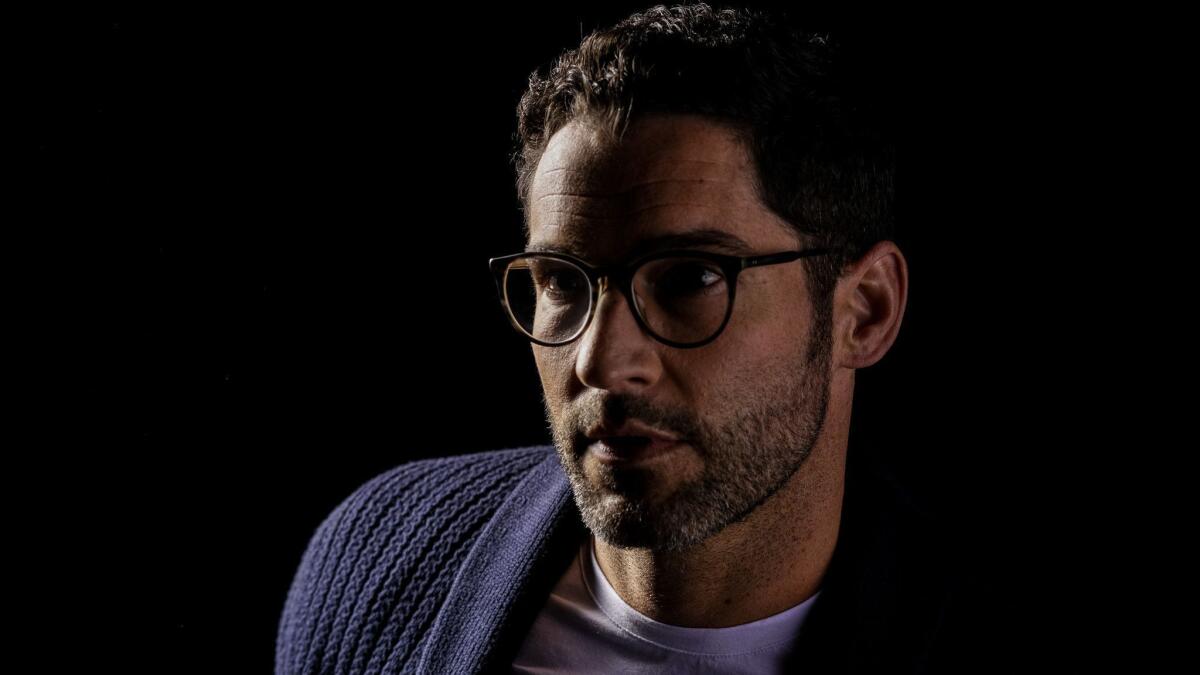How ‘Lucifer,’ banished from Fox, found sympathy for the devil from Netflix

- Share via
“Lucifer” has been to hell and back.
The cast and producers of the drama about the Prince of Darkness who gets bored in hell and winds up in Los Angeles as a nightclub owner and police crime consultant are rejoicing over its resurrection by Netflix, which followed a painful cancellation by Fox.
The fourth season of the series dropped last week on the streaming service, which revived the show after a legion of fans in this country and abroad staged an intense Twitter campaign protesting its ouster and pleading for a reprieve from another network. The pickup is one of the first instances where Netflix, which specializes in original series and films, has picked up a show from a major U.S. broadcast network. (Netflix next month will air the third season of “Designated Survivor,” which was canceled last year by ABC.)
“It feels amazing, actually,” Tom Ellis, who stars as Lucifer Morningstar, says on a soundstage at Warner Bros. Studios in Burbank where the show is filmed. “It was rather an upsetting experience to be canceled. I was not ready for the show to be over.”
Adds executive producer Ildy Mondrovich: “We’re the little engine that could. When we were canceled, I cried in the closet for a couple of hours. But it’s actually the best thing that’s ever happened to us, because we found out how people were really connected to the show.”
Although “Lucifier,” which is based on a DC Comics character, is no longer bound by broadcast standards and regulations, don’t expect the series to be more devilish in its storytelling. Except for a brief shot of Ellis’ nude rear end in the first episode, the tone and flavor of the series remains largely the same as the broadcast version.
“It was important for us to remain true to the fans who saved us,” Mondrovich says. “We didn’t want to reinvent the wheel. We did feel we could go deeper into the mythology and also tell more personal stories. And Netflix encouraged us to have cliffhangers at the end of each episode, and write to the serialized format a lot more. That was fun for us to do.”
The other major switch is a shorter season. The first three seasons of the show weighed in with more than 20 episodes apiece, which is typical for broadcast network series, while the Netflix version has only 10 episodes.
“We can be leaner and meaner — we can get right down to telling our story,” Ellis says.
That story reached a cliffhanger finale in the third season when Lucifer, whose usual form is a handsome playboy with a smooth English accent, changes physically into his demonic self, much to the horror of his partner — and potential love interest — detective Chloe Decker (Lauren German), the one person who has been immune to Lucifer’s charms.
“We wrote that ending because we just knew we were coming back,” says executive producer Joe Henderson. “When we were canceled, we were crushed, just total devastation.”
Ellis was attending a “Lucifer” fan convention in Rome when he got the bad news.
“I had just come offstage from doing this Q&A,” he says. “I had been put on this pedestal for an hour, and had gotten back on a minibus to get back to the hotel to have dinner with friends. I got a call from Joe that the show had been canceled. Everyone on the bus knew what that conversation was. The mood went from joy to deathly silence.”
Fox executives first blamed the cancellation on ratings, saying that “Lucifer” was not drawing enough viewership to warrant a renewal. But later, then-Fox Television Group Chief Executive Dana Walden also said that economics had played a role. The series is produced by Warner Bros. Studios in association with Jerry Bruckheimer Television, and “we couldn’t justify the economics” of paying for a show from another studio, she said in interviews.
Fans of the show were quick to register their anger on Twitter with the hashtags #SaveLucifer and #PickUpLucifer. According to @twittertv, 3.64 million tweets and 5.63 million retweets included #SaveLucifer between May 8 and April 8 last year.
“There was this terrific fan uprising,” Henderson says.
“We heard from Romania, Egypt, Brazil,” Modrovich says. “It was truly moving. The fact that it actually worked speaks to a brand new landscape in television.”
Ellis says he became quite emotional when he learned that Netflix had picked up the series.
“I sort of broke down,” Ellis says, recalling how he felt when Warner Bros. Television head Peter Roth called him with the news. “It was similar for the rest of the cast. When we got back together, we were just so grateful and thankful to have had this experience. Weirdly, if it hadn’t been canceled, none of us would have had an inkling of how popular and loved the show is.”
Neflix is also streaming the first three seasons, and Ellis as Lucifer provides a brief recap in the beginning of the new season. The original cast has returned, and this season brings two new characters — Eve (Inbar Lavi), Lucifer’s first love from the Garden of Eden, and Father Kinley (Graham McTavish), who is plotting to return Lucifer to hell.
“What happened with the cancellation really energized us,” Ellis says. “I think it’s our best season yet.”
‘Lucifer’
Where: Netflix
When: Any time
Rating: TV-14 (may be unsuitable for children under the age of 14)
More to Read
The complete guide to home viewing
Get Screen Gab for everything about the TV shows and streaming movies everyone’s talking about.
You may occasionally receive promotional content from the Los Angeles Times.







